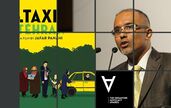Taxi evaluation action
-
Vanessa 2022-03-29 09:01:07
In fact, this recording/private video/or similar shooting method is not a new creation of the director. In my opinion, the award is mainly because it reflects the various characters and ordinary and special lives in Iran, and it is a praise for the love of movies and the courage to express. The most precious thing is the calmness that is not sensational or complaining. There are so many similarities between Iran and the land beneath our feet, whether it is from the cityscape or the land under our feet. Bonus points for nieces and female lawyers; bonus points for handsome directors, charming smiles, and courage.
-
Noah 2022-03-19 09:01:08
In the future, "filming in a taxi" can replace "dancing in shackles". The cramped space and the handful of seats have not been able to weaken Panasi's ambitions. The political, class, social, religious, and female levels must not be less than one parting, but Panasi's goal is clearer and all point to "freedom." The two non-fixed camera positions changed the perspective, blurring reality and fiction, showing the civilianization of the film, and it is a finishing touch. The characters are smart, and the ending is brilliant.
Top cast
Taxi quotes
-
Nasrin Sotoudeh: They work in a way that let us to know they are watching us.Their tactics are obvious.First, they write you up a police record. Suddenly, you are accused of being an agent for Mossad, The CIA, or MI6. Then they tack on something about your morals, your lifestyle. They make your life into a prison.Although you are released from prison, but the outside world is only a bigger prison.They make your nearest friends into your worst enemies.After that you think all you can do is either leave the country or pray to return to that hole. So i think it's better to let it go.
-
Jafar Panahi: Those films are already made, those books are already written. You have to look elsewhere, you have to find it for yourself.







